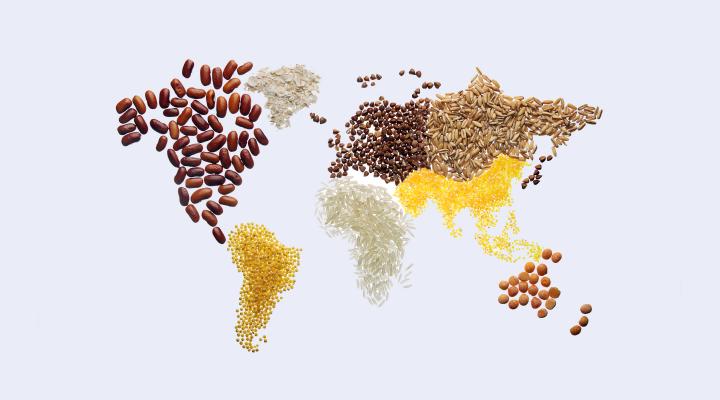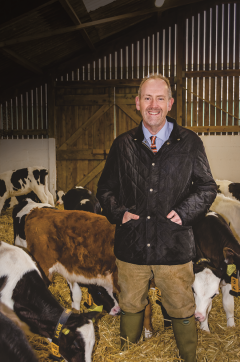Feed the world
Faced with a rapidly growing global population with evolving dietary demands, and food choices, the agri-food sector, researchers and specialists are under more pressure than ever to adapt agricultural methods to feed more mouths while also protecting the planet. In the Edit interview, Professor Geoff Simm, Director of the University’s Global Academy of Agriculture and Food Security, talks about facing up to the challenges and finding solutions.

Interview
What is global food security?
The greatest challenge facing global agriculture is to achieve food security while protecting the planet. Food security is about all people having access to a safe, affordable and nutritious supply of food at all times. It sounds very simple when you say it quickly but it’s one of the most complex challenges facing society.
What are the key challenges facing global food security?
Global food insecurity is a complex problem. It’s impacted by many other global challenges. It’s also exacerbated by the fact that the human population is growing dramatically. It’s about 7.5 billion now and we’re expecting it to top 11 billion by the end of the century. Feeding so many more mouths is going to be a challenge.
Not only that, but people are expecting different types of diets. Many people in developing countries emerging from poverty aspire to a western diet, which typically means more livestock products. This creates more pressure on food producing systems, because animal products typically need more land than crop-based products. While much agricultural land globally is used to grow livestock feed, livestock also use by-products, and ruminants, such as cattle and sheep, have the unique ability to produce high-quality human food from the grassland that occupies the majority of farmland globally. Livestock also have a pivotal role in some of the poorest societies globally, and here even small amounts of livestock products can have a dramatic effect on the physical and cognitive development of children.
While research and innovation will help improve the efficiency with which we use our natural resources, changes in consumption behaviour will be needed to achieve sustainability. So we need work in human behaviour, in nutrition and health as well as in agriculture, to develop sustainable healthy diets.
That’s challenging enough but we’re trying to deal with these issues at a time when the climate globally is changing as well. That’s putting a lot of pressure on those parts of the world that have traditionally grown much of their own food. So trying to understand that dynamic is a big challenge. Agriculture already puts a lot of pressure on the environment so we need to find a way to meet the aspirations of that growing population in a way that’s not destroying the planet but will deliver that safe and affordable food for all.

As well as the physical challenges of producing food, what other issues face food security?
Food security is about more than the physical challenges, though they’re very plentiful as we’ve discussed. But, actually, food is a hugely important cultural issue. There are social and political implications too. The whole business of food security is central to civil society. Over the last few decades we’ve seen civil unrest in many countries that have had big rises in food prices, so it’s important to global security that we improve food security.
There’s a huge paradox around food security in that we have around 800 million people on the planet who are starving yet at the same time around 2 billion who are overweight, so understanding how diet and health interact, understanding how food choices affect health in the West as well as improving food security for those who are starving is part of the Global Academy of Agriculture and Food Security’s ambition. The current crisis in east Africa provides a very stark reminder of the scale and impact of the food security challenge.
What role can the Global Academy of Agriculture and Food Security play in tackling these issues?
Edinburgh has many strengths in biological sciences, geosciences, informatics, biomedicine, politics and society, all of these areas have contributions to make to understanding and improving food security.
For instance, the Royal (Dick) School of Veterinary Studies at the University has a major international reputation and in particular has contributed much to animal health in many of the low- and middle-income countries around the world over the last few decades. The Global Academy is about building on that foundation and broadening it to many other areas where the University and its partners can contribute as well.
Modern developments in genetics at the Roslin Institute and elsewhere has a huge role to play, while data science is having a huge impact on many branches of society and also can have a big role in tackling global food insecurity.
And in geosciences, understanding the changing climate, and how we develop our crop and livestock systems to adapt to that is very important. We recently hosted a workshop in Kenya looking at the role of earth observation – from satellites, drones and sensors – in helping to develop climate-smart agriculture, and we see this as a promising area of future research.
The Academy will be a melting pot where each of these areas can come together, share ideas and develop new interdisciplinary solutions to some of these really pressing challenges.
Understanding how food choices affect health in the West as well as improving food security for those who are starving is part of the Academy’s ambition.
Research is obviously crucial; how important is teaching?
If we’re going to face these challenges that are massive in scale, it’s important that we mobilise and train students, who will become tomorrow’s leaders in tackling these issues. These problems are interdisciplinary and interconnected and require a new approach from what we’ve expected of our students until now.
The University already has a fantastic reputation in delivering online distance and face-to-face learning and we’ll be developing new courses designed to help develop this next generation of leaders, including in the countries most affected by food security issues.
We plan to launch several new undergraduate programmes relevant to global agriculture for first student entry in 2018; and as we start to see students coming through our education programmes who are helping to find solutions to these global challenges, then we’ll know that we’re starting to make a major contribution.
Food map of the world image by iStock/susoy.
Video
Professor Simm discussing the University's new Global Academy of Agriculture and Food Security.
Why study Agricultural Science?
Professor Geoff Simm discusses the many challenges facing modern society and how agricultural scientists can address them..
Find out more
You can read more on this topic on the Global Academy of Agricultural and Food Security website.
Global Academy of Agricultural and Food Security website

